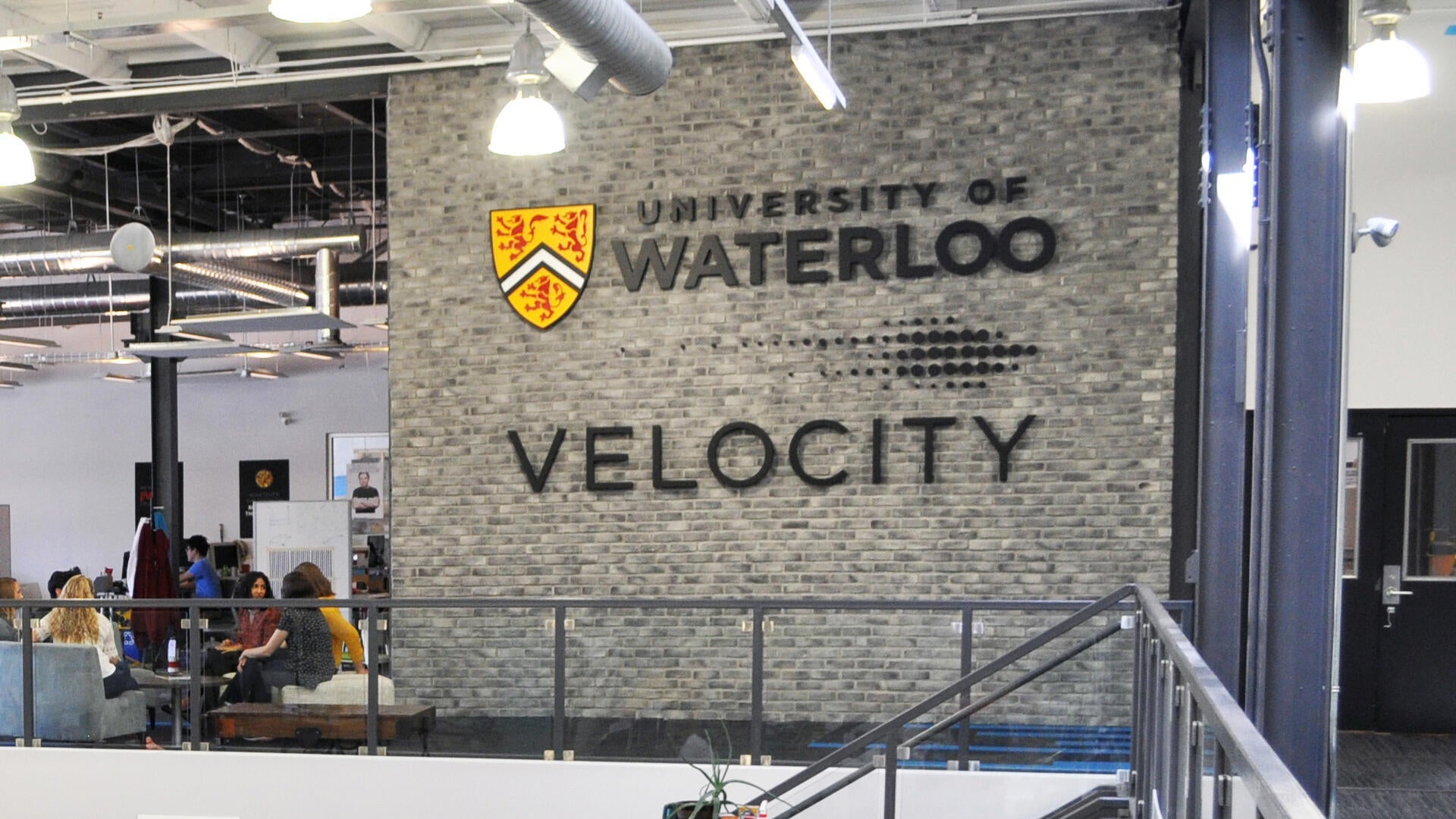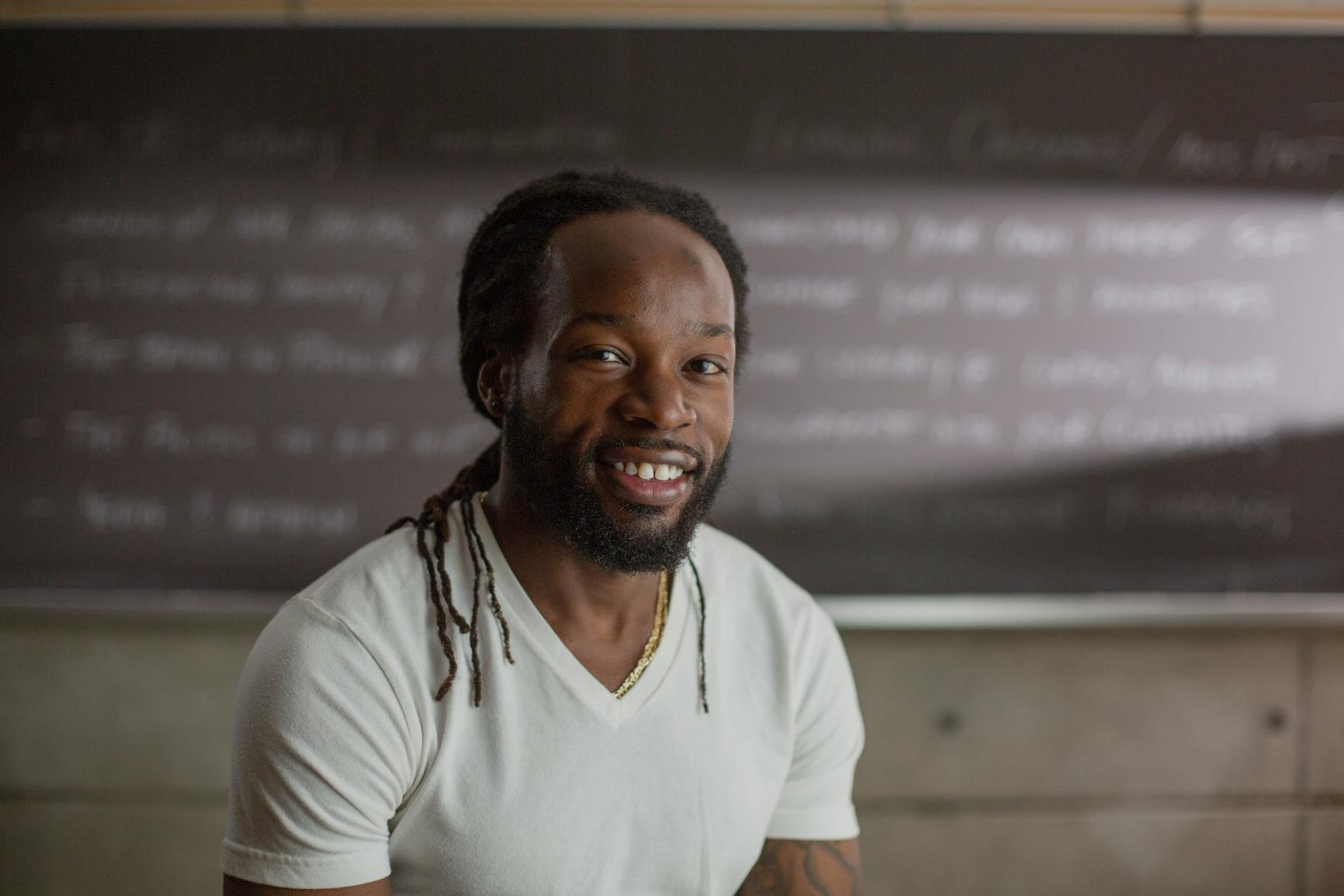Editor:
Brandon Sweet
University Communications
bulletin@uwaterloo.ca
Nine on the way to a billion

By Jon Parsons. This article was originally published on Waterloo News.
Nine startups with links to the University of Waterloo were named in a recent report tracking Canadian companies on their way to $1 billion annual revenues, including four companies that grew out of Waterloo’s renowned entrepreneurship program and startup incubator Velocity.
“Canada’s tech ecosystem continues to evolve,” says Adrien Côté, executive director of Velocity. “Communitech’s report adds a new lens and reveals the depth of impact people from the University of Waterloo make in Canada’s economy. Likewise, evolving the conditions that attract and support entrepreneurially minded people to Waterloo continues to be our mission.”
Waterloo’s distinctive innovation ecosystem encourages entrepreneurs by opening pathways from research to commercialization through incubators, corporate partnerships and a unique intellectual property policy that lets creators own what they invent.
The nine companies on their way to billion-dollar annual revenues with links to Waterloo are:
- ApplyBoard, an educational technology company that streamlines the application process for international students, which was co-founded by Waterloo alums Martin Basiri (MASc ’13) along with his brothers Meti and Massi Basiri. ApplyBoard was incubated at Velocity.
- Arctic Wolf, a cybersecurity company co-founded by Waterloo alum Kim Tremblay (BMath, ’84), has achieved tremendous growth since acquiring its “unicorn” status only two years ago.
- ClearCo, a financial technology company co-founded by Waterloo alums Andrew D’Souza (BASc ’08) and Ivan Gritsiniak (BMath ’16), achieved “unicorn” status in 2021.
- Ecopia, an artificial intelligence company co-founded by University of Waterloo alums Yuanming Shu (MSc ’10, PhD ’15) and Shuo Tan (MSc ’10), is changing how we map the world. Ecopia was incubated at Velocity.
- eSentire, a cybersecurity company founded by a Waterloo alum, Eldon Sprickerhoff (BMath ’91).
- Faire, a wholesale marketplace company co-founded by Waterloo alum Marcelo Cortes (BCS ’04) is currently valued at $12.4B. Faire was incubated at Velocity.
- Solink, a cloud video security company co-founded by Waterloo alum Mike Matta (BASc ’07).
- Trusscore, a building material company whose founder, Dave Caputo, is chair of the board for Communitech, and which was incubated at Velocity.
- Vidyard, a SaaS company co-founded by Waterloo alums Michael Litt (BASc ’11) and Devon Gallaway (BASc ’10), which provides a platform for asynchronous communications grew exponentially during the pandemic. Vidyard was incubated at Velocity.
Communitech partnered with well-known Canadian finance companies and business analysts to generate robust data for the report, which followed criteria related to annual revenue and year-on-year revenue growth.
Re-introducing the Curve with Dr. Christopher Taylor

This article originally appeared in The Catalyst e-newsletter.
The Curve with Christopher is a podcast series hosted by Dr. Christopher S. Taylor, associate vice-president of Equity, Diversity, Inclusion and Anti-racism, which features discussions about sports and its intersections with race, history, culture, and society.
Dr. Taylor will be re-launching “The Curve,” as a resource for starting productive exchanges on topics related to equity, diversity, inclusion, race and identity, expanding beyond just sports.
Starting September, new episodes of the Curve will be posted monthly on the office of Equity, Diversity, Inclusion & Anti-racism Competency and Capacity Building webpage, as a learning resource.
Racism can take different forms and understanding this affect individuals, institutions, and systems is an important first step to dismantling racism and building a more inclusive community. The Curve aims to encourage conversation, educate and empower its listeners to act intentionally to eradicate systemic racism, bias and discrimination.
Dr. Taylor hopes to leverage the podcast as an informal, yet useful tool for increasing engagement and knowledge sharing and providing mentorship, skills training or professional development, while building community in an innovative format.
“Talking about racism is a necessary step towards addressing discrimination and inequities,” Dr. Taylor said. “For many individuals, particularly those who are just beginning to understand how institutional and systemic racism has affected the lives of others, these difficult conversations can be uncomfortable. The Curve acts as a learning resource for fostering meaningful and productive dialogue.”
The Curve also provides opportunities for members of the University community to access learning resources, without having to stare at a screen, or be confined to one space.
“For meaningful learning to occur, I believe all people must be challenged to think critically, to deconstruct their understandings of the world, and the people around them, he said. “I think The Curve is an excellent channel to assist in creating a learning space which encourages growth, while ensuring safety.”
Dr. Taylor is grateful to past guests of The Curve, who have shared stories, experiences and perspectives. He says that although he brings a wealth of expertise to these conversations, his role in this series will be more of a guide and facilitator.
Find recent episodes of The Curve here.
Mathematics alumni and researchers create new standardizations encryption

This article was originally published on the Faculty of Mathematics website.
As we dawn on the age of quantum computing and work to harness its power and potential, there is an inherited risk of new types of cyber attacks from these increasingly powerful computers. In preparation for this possibility, the United States National Institute of Standards and Technology (NIST) called on cryptographers in 2016 to create and vet new algorithms to protect government and industry digital communication from attacks by quantum computers.
Since this initial call to action, 69 different algorithms have been submitted and vetted with the final field narrowed down and announced in July 2022. Among those selected for standardization of general encryption was CRYSTALS-Kyber which features co-author John Schanck, who completed his Masters of Mathematics as well as his Ph.D. with the Department of Combinatorics and Optimization with a focus on cryptography and quantum information. Kyber was selected for standardization with a noted advantage as "comparatively small encryption keys that two parties can exchange easily, as well as its speed of operation".
In addition to the selection of Schanck, Combinatorics and Optimization Professor David Jao's project was selected to advance to the next round of consideration for standardization. Jao is the co-inventor and project lead for SIKE (Supersingular Isogeny Key Encapsulation), which is an alternate candidate for Public-key Encryption and Key-establishment Algorithms that relies on a different hard problem than all of the other post-quantum cryptosystems being evaluated by NIST.
Read more about Schanck's, Jao's, and the rest of the quantum-resistant cryptographic algorithms in consideration for standardization on the NIST website.
Link of the day
The making of Daft Punk's Around the World music video
When and Where to get support
Students can visit the Student Success Office online for supports including academic development, international student resources, immigration consulting, leadership development, exchange and study abroad, and opportunities to get involved.
Instructors looking for targeted support for developing online components for blended learning courses, transitioning remote to fully online courses, revising current online courses, and more please visit Agile Development | Centre for Extended Learning | University of Waterloo (uwaterloo.ca).
Instructors can visit the Keep Learning website to get support on adapting their teaching and learning plans for an online environment.
Course templates are available within your course in LEARN to help you build and edit your content and assignment pages quickly.
The following workshops, webinars, and events are offered by the KL team (CTE, CEL, ITMS, LIB):
-
Scholarship of Teaching and Learning (SoTL) Methods – self-directed, continuous self-enrollment course in LEARN.
-
Independent Blended Course Design (iBlend) - self-directed, continuous self-enrollment course in LEARN.
-
Copyright Overview for Waterloo Instructors and Staff - self-directed, continuous self-enrollment course in LEARN.
-
Independent Remote Course Design Essentials (iReCoDE) - self-directed, continuous self-enrollment course in LEARN.
-
Supporting Student Mental Health (for Instructors) – self-directed, continuous self-enrollment course in LEARN.
Supports are available for employees returning to campus. Visit IST’s Hybrid Work and Technology guidelines and workplace protocols to assist with the transition.
The Writing and Communication Centre has in-person and virtual services to support grad and undergrad students, postdocs and faculty with any writing or communication project. Services include one-to-one appointments, drop-ins at Dana Porter Library, online workshops, writing groups, English conversation practice, and custom in-class workshops.
Co-op students can get help finding a job and find supports to successfully work remotely, develop new skills, access wellness and career information, and contact a co-op or career advisor.
The Centre for Career Action (CCA) has services and programs to support undergrads, grad students, postdocs, alumni, and employees in figuring out what they value, what they’re good at, and how to access meaningful work, co-op, volunteer, or graduate/professional school opportunities. Questions about CCA's services? Live chat, call 519-888-4047, or stop by our front desk in the Tatham Centre 8:30 a.m. to 4:30 p.m., Monday to Friday.
Drop-in to Warrior Virtual Study Halls on Wednesdays from 5:30 p.m. to 7:00 p.m. Come together in this virtual space to set goals and work independently or in groups each week.
Renison's English Language Institute continues to offer virtual events and workshops to help students practice their English language skills.
If you feel overwhelmed or anxious and need to talk to somebody, please contact the University’s Campus Wellness services, either Health Services or Counselling Services. You can also contact the University's Centre for Mental Health Research and Treatment. Good2Talk is a post-secondary student helpline available to all students.
The Library is open with expanded hours for access to book stacks, drop-in individual study space, bookable group study rooms, drop-in access to computers and printers, book pick-up services and IST Help Desk support. Librarian consultations, Special Collections & Archives and the Geospatial Centre are available by appointment. Full details on current services and hours are available on the Library’s COVID-19 Update webpage.
The Faculty Association of the University of Waterloo (FAUW) continues to advocate for its members. Check out the FAUW blog for more information.
The University of Waterloo Staff Association (UWSA) continues to advocate for its members. Check out the UWSA blog for more information.
The Sexual Violence Prevention and Response Office (SVPRO) supports all members of the University of Waterloo campus community who have experienced, or been impacted, by sexual violence. This includes all students, staff, faculty and visitors on the main campus, the satellite campuses, and at the affiliated and federated Waterloo Institutes and Colleges. For support, email: svpro@uwaterloo.ca or visit the SVPRO website.
The Office of Indigenous Relations is a central hub that provides guidance, support, and resources to all Indigenous and non-Indigenous campus community members and oversees the University's Indigenization strategy.
The Waterloo Indigenous Student Centre, based at St. Paul’s University College, provides support and resources for Indigenous students, and educational outreach programs for the broader community, including lectures, and events.
WUSA supports for students:
Peer support - MATES, Glow Centre, RAISE, Women’s Centre - Click on one of the links to book an appointment either in person or online for the term.
Food Support Service food hampers are currently available from the Turnkey Desk 24/7 in the Student Life Centre. Drop-off locations are also open again in SLC, DC, DP, SCH, and all residences.
Co-op Connection all available online.
Centre for Academic Policy Support - CAPS is here to assist Waterloo undergraduates throughout their experience in navigating academic policy in the instances of filing petitions, grievances and appeals. Please contact them at caps@wusa.ca.
WUSA Student Legal Protection Program - Seeking legal counsel can be intimidating, especially if it’s your first time facing a legal issue. The legal assistance helpline provides quick access to legal advice in any area of law, including criminal. Just call 1-833-202-4571.
Empower Me is a confidential mental health and wellness service that connects students with qualified counsellors 24/7. They can be reached at 1-833-628-5589.
GSA-UW supports for graduate students:
The Graduate Student Association (GSA-UW) supports students’ academic and social experience and promotes their well-being.
Advising and Support - The GSA advises graduate students experiencing challenges and can help with navigating university policies & filing a grievance, appeal, or petition.
Mental Health covered by the Health Plan - The GSA Health Plan now has an 80 per cent coverage rate (up to $800/year) for Mental Health Practitioners. Your plan includes coverage for psychologists, registered social workers, psychotherapists, and clinical counselors.
Dental Care - The GSA Dental Plan covers 60 to 70 per cent of your dental costs and by visiting dental professionals who are members of the Studentcare Networks, you can receive an additional 20 to 30 per cent coverage.
Student Legal Protection Program - Your GSA fees give you access to unlimited legal advice, accessible via a toll-free helpline: +1-833-202-4571. This advice covers topics including housing disputes, employment disputes, and disputes with an academic institution.
The Graduate House: Open Monday to Tuesday 11:30 a.m. to 7:00 p.m. and Wednesday to Friday 11:30 a.m. to 9:00 p.m. We’re open to all students, faculty, staff, and community members. The Graduate House is a community space run by the GSA-UW. We’re adding new items to the menu. Graduate students who paid their fees can get discounts and free coffee.
When and Where (but mostly when)
Warriors vs. Laurier Blood Donation Battle. Join our “Waterloo Warriors” team on the Blood.ca website or app. #ItsInYouToGive
Warriors Youth Summer Day Camps, July 4 to September 2. Open to boys and girls age 5-18. Baseball, Basketball, Football, Hockey, Multi-Sport and Games & Volleyball. Register today.
FLIGHT Virtual Summer Camp, Tuesday, August 2 to August 13. FLIGHT virtual summer camp provides a strong introduction to tech entrepreneurship to girls aged 13-18 who self-identify as Black or another underrepresented minority.
Part-Time Master of Business, Entrepreneurship and Technology Information Session, Wednesday, August 3, 12:00 p.m. to 1:00 p.m., Zoom. Registration required.
Insights into social and cultural values for water from community engaged research, presented by Lori Bradford.Part of the Water Institute's webinar series: The Value of Water in Canada, Wednesday, August 3, 12:00 noon.
Indigenous Learning Circle - Medicine Knowledge, Thursday, August 4, 2:00 p.m. to 4:00 p.m., BC Matthews Green.
2022 Global Summit: Nanotechnology for a Healthier and Sustainable Future, Wednesday, August 10 and Thursday, August 11.
Positions available
On this week's list from the human resources department, viewable on the UWaterloo Talent Acquisition System (iCIMS):
- Job #2022-8976: Director, Strategic Initiatives, Office of the Vice President Academic and Provost, USG 14
- Job #2022-8611: Manager, Technical Resources, Science Technical Services, USG 11
- Job #2022-8794: Manager, Undergraduate Career Services, CEE - Centre for Career Action, USG 12
- Job #2022-8862: Data Analyst, Campus Wellness – Administration, USG 8
- Job #2022-8912: Information Technology Specialist, Math Faculty Computing Facility, USG 9 - 13
- Job #2022-8924: Laboratory Instructor / Supervisor, Electrical and Computer Engineering, USG 12
- Job #2022-8944: Assistant Chef, Food Services, USG 5 - 6
- Job #2022-8962: Kitchen Porter, Food Services, CUPE
Secondments/Internal temporary opportunities
- Job #2022-8972: HR Systems Analyst, Human Resources, USG 7
- Job #2022-8921: Manager, International Relations, Waterloo International, USG 10
- Job #2022-8951: Building Serviceperson I – Mason, Plant Operations, CUPE
Affiliated and Federated Institutions of Waterloo opportunities